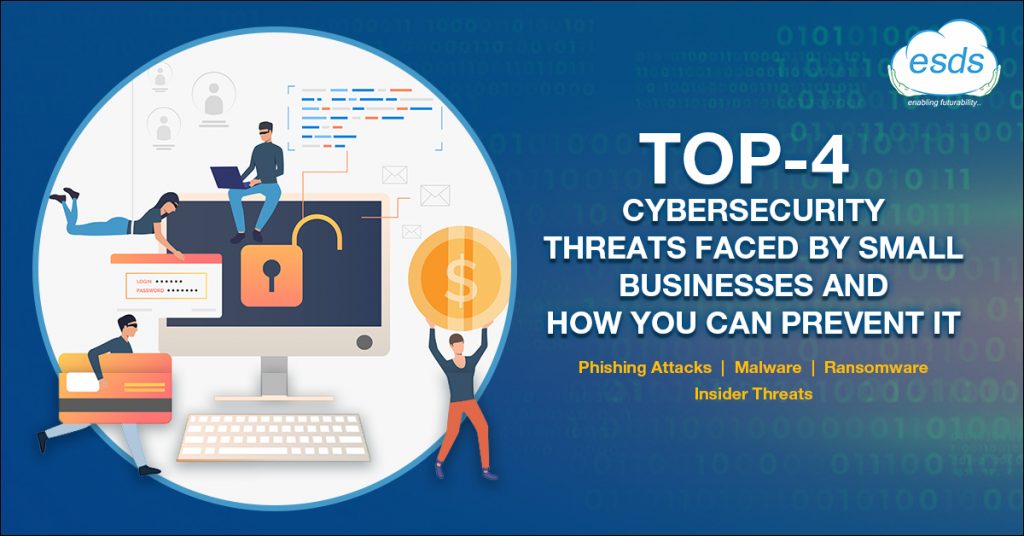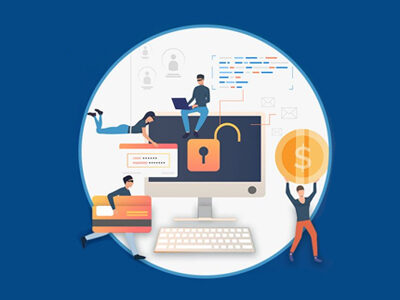Top-4 Cybersecurity Threats Faced by Small Businesses And How You Can Prevent It
Be it a small business or an enterprise, cybersecurity threats possess the same amount of risk. There is a common myth that exists that a small business can’t become a potential target of any cybersecurity; however, this is not the case.

With an increasing number of automated cyberattacks rising every day, it has allowed small businesses to serve as soft-targets. When compared to larger enterprises, small businesses are low on resources and often don’t tend to invest quite extensively on security technologies. Due to the lack of dedicated and stringent cybersecurity measures, it makes them an easier target of cybercriminals.
A cyberattack can result in a damaged image for such business and its post-effects can be quite devastating. An online report states that a small business with an employee cap less than 500, tend to lose around $2.5 million after every cyberattack. Losing out such a huge amount of money can be financially demotivating for any small business. Keeping in mind all these reasons, small businesses must make sure that they’re aware of these threats and how they can stop them in the initial stages.
In the following section, we shall see the top-4 cybersecurity threats faced by small businesses and how to counter these.
- Phishing Attacks
Over the past few years in the cybersecurity domain, phishing attacks have emerged as one of the most common forms of cybersecurity hacks. It has targeted large enterprises and small businesses similarly. Phishing attacks depict a form of social engineering attacks, where the cybercriminals deploy their knowledge of human behavior to gain the desired information. In a phishing attack, hackers try to capture user’s clicks on a real-looking link or attachment. Business owners often tend to get fooled by such baits laid by hackers and they react impulsively by clicking on such malicious links.
How to Prevent?
To avoid falling into such traps, small business owners must make sure they don’t click on such malicious links if they’re not familiar with the sender’s details. Small business owners must also train their internal staff regarding security mechanisms. They must also make sure that they have recent software updates, making it difficult for hackers to penetrate.
- Malware
Malware is another biggest threat that small businesses face. It contains a number of cyber threats and is often used for defining a malicious code developed hackers for gaining access to businesses’ networks, steal and damage the data present on the systems. Talking about small businesses, it can prove to be quite denting. Malware can damage businesses’ devices and systems. Malware also provides attackers with illegal access to the customers’ and employees’ data.
How to Prevent?
Malware gets spread on small businesses when their employees visit a hacked website or download infected files. Companies can avoid malware attacks by deploying strong technological mechanisms in place. Small businesses must train their staff regarding the importance of web security. Having a website vulnerability scanning tool for the business’ website can ensure that their website is safe from all kinds of online malware, threats, and vulnerabilities.
- Ransomware
Ransomware is also one of the common forms of cyberattacks that has been damaging businesses every year. Over the past few years, ransomware is being used by hackers to gain colossal profit by encrypting critical data of a company. Since businesses are unable to use their data, they are forced to pay a ransom to hackers so that their data gets released. For small businesses, ransomware can be perceived as no less than a nightmare. Hackers are aware of the fact that small businesses don’t usually tend to have backups of their data and will be forced to pay large sums of money to restore and keep their data up at the earliest. An online report states in the year 2019, small businesses were forced to pay an average amount of $120,000.
How to Prevent?
For preventing a ransomware attack, small businesses must include tools like content scanning on their mail servers. All inbound mails can be scanned for any kind of threat and blocking potentially dangerous attachments. Besides mail server tools, small businesses must ensure that their data is securely replicated on a different location besides the hosted server. In case of such attacks, data from the replicated site can be immediately fetched to prevent any downtime concerns. Lastly, having a trusted web application firewall from a reputed provider can also prove to be extremely beneficial as it provides an additional protection layer.
- Insider Threats
Another major threat small businesses face is insider threats. Insider threats are an increasing problem and can lead to creating substantial financial damages to this business segment. An insider threat is a potential risk for a business that is caused due to the actions of employees, ex-employees, etc. All these actors hold access to the crucial data of the company. Talking about small businesses, employees usually have access to various accounts and thus, they are responsible for managing more data.
How to Prevent?
The first step taken to prevent insider threats should be that small businesses must make sure that the culture of security awareness is strongly inculcated in their organization. This will help in overcoming insider threats caused due to ignorance and assist their employees with early detection in case there has been an attempted compromise on business data.
Concluding Remarks
Today, small businesses are facing several cybersecurity threats. All these cybersecurity threats can disrupt the way small businesses operate. Awareness regarding cyber threats and a company-wide implementation of cybersecurity protocols serve as the foundation step towards strengthening the cybersecurity posture of such organizations. Small business must also train their employees regularly about various cybersecurity threats and how to combat them, to prevent any damage and loss in any form to their business.
Today, many Indian companies like ESDS are offering small businesses with their security products to ensure they are always secure from all cyber threats and there is no hindrance in business operations.
- Considering Data Centers in India to Overcome Economic Conditions - May 10, 2022
- Determining Why Your Organization Needs Web Application Security - February 11, 2022
- How Does a Business Benefit with Managed Services - January 21, 2022
